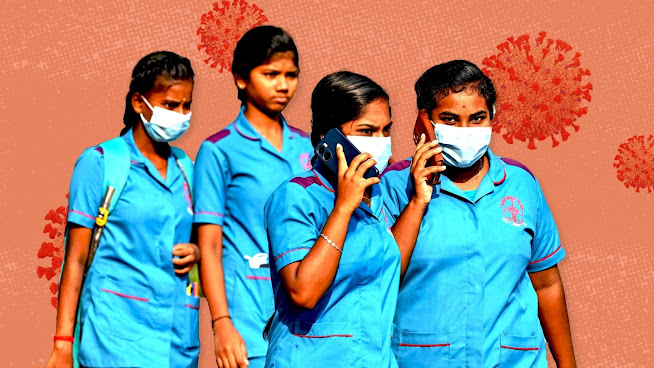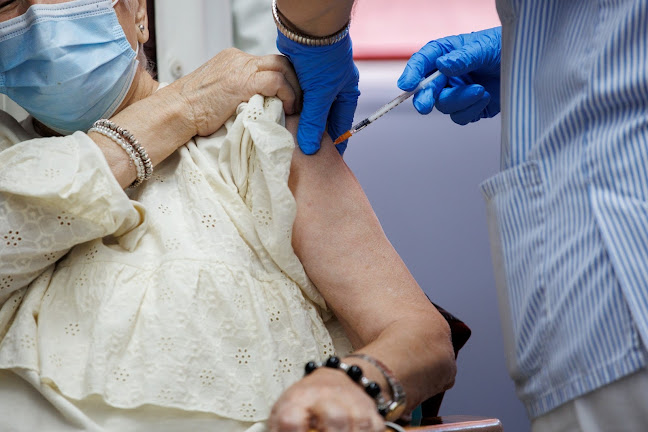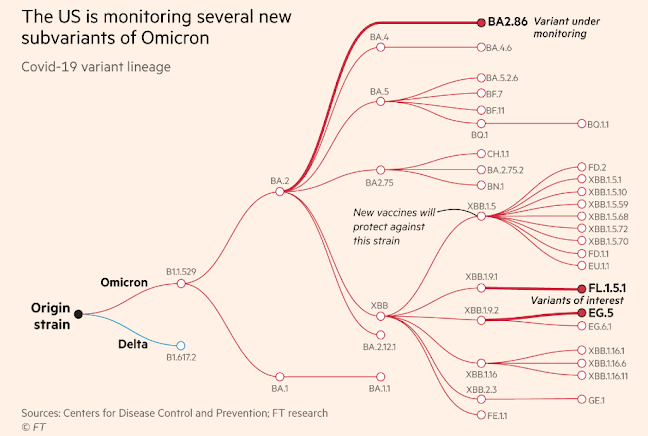‘We haven’t seen the end of Covid’: surge in cases to test health systems
As vaccines are tweaked while new sub-variants emerge, the virus cannot be treated yet as a seasonal bug
Hannah Kuchler in London
 Mask-wearing is set to increase as Covid cases steadily rise again © FT montage; AFP/Getty/Dreamstime
Mask-wearing is set to increase as Covid cases steadily rise again © FT montage; AFP/Getty/DreamstimeScientists are warning that the world is vulnerable to a dangerous wave of coronavirus infections after an increase in cases driven by new Omicron variants over the summer.
As workers return from holidays and children go back to school, governments, regulators and vaccine makers are gearing up for an autumn Covid-19 booster season, tweaking shots to cope with the most prevalent variants and targeting the most vulnerable citizens at the same time as flu immunisation campaigns.
With hospitalisation rates low but rising, experts said Covid-19 cannot yet be treated as a seasonal virus like flu.
The US Centers for Disease Control and Prevention warned last week that a new sub-variant, BA.2.86, may be more able to cause infection in people who have previously had Covid or been vaccinated against it, and urged the vulnerable to wear masks in public places.
Angela Rasmussen, a virologist at the University of Saskatchewan in Canada, said “all bets are off” if a variant that is more transmissible than Omicron, the dominant strain for nearly two years, emerges.
“You would start to see [increased cases] wherever there was a nice susceptible population and not necessarily just in winter when conditions are very good for transmission,” she said.
“We haven’t seen the end of this virus.
It’s going to [continue to] acquire mutations and that has unpredictable results.”
Is Covid becoming a winter disease?
Last winter Covid infections in the northern hemisphere peaked around Christmas, before dropping in the spring and summer.
But experts warn that it is premature to expect the disease to follow the pattern of other respiratory infections.
Adam Kucharski, professor of infectious disease epidemiology at the London School of Hygiene & Tropical Medicine, said there was a “surprisingly stable” pattern last year, but warned: “I don’t think that’s automatically a reason to expect Covid to peak in late December again.
It is plausible there might be multiple smaller peaks going into winter.”
Transmission increases as people mix indoors in winter, but in warmer climates such as the southern US states it can also rise during the summer as people huddle indoors to avoid the heat.
In 2020-21, before the widespread rollout of vaccines, if one variant looked “nasty here, it would be nasty [everywhere]”, Kucharski said.
But now different populations have been exposed to varied strains, it is becoming harder to predict the severity of new variants as they cross into new regions, he added.
Will a powerful new variant emerge?
While politicians’ attention has shifted to the economic recovery from the pandemic, many scientists still believe there is a significant chance that a variant powerful enough to evade the population’s existing defences will emerge.
Eric Topol, director of San Diego’s Scripps Research Translational Institute, said it was not clear how transmissible BA.2.86 is.
Vaccine makers have not yet shown whether their tweaked shots can tackle the latest strain, but Topol warned the boosters might not help much because it had undergone 30 mutations.
Before the emergence of the latest sub-variants such as BA.2.86, EG.5.1 and FL.1.5, Topol surveyed 10 experts about the likelihood of another “Omicron-like event” where the virus undergoes a “hyper-accelerated evolution”, most likely in an immunocompromised host.
The average probability of such an event happening by 2025 was put at 10 to 20 per cent, with one expert putting the chances at 38 per cent.
“The risk is too high to turn your back on,” Topol said.
Are new vaccines ready?
The elderly and vulnerable will be offered Covid boosters in many countries this autumn.
Manufacturers followed advice from the US Food and Drug Administration to update the shots to protect against the prevalent XBB.1.5 Omicron sub-variant.
Unlike last year, when some vaccines targeted two variants, the FDA recommended that they should focus on this one.
The EU’s drugs regulator said targeting XBB.1.5 would be a “reasonable choice” but is open to shots containing other XBB strains.
 A nurse vaccinates an elderly woman at a nursing home © Alejandro Martinez Velez/Europa Press/Getty Images
A nurse vaccinates an elderly woman at a nursing home © Alejandro Martinez Velez/Europa Press/Getty ImagesThe campaigns will largely use the messenger RNA-based shots from BioNTech/Pfizer and Moderna.
Pfizer aims to have its latest booster available at the same time as its updated flu shots — in late September or early October, delivering shots owed under existing contracts.
Moderna expects to sell 50mn-100mn shots in the US and will supply the UK at a similar time, but is still in negotiations with the EU.
Work on pan-coronavirus vaccines continues but immunologists said it was hard to hold trials for a jab designed to tackle many sources of respiratory disease when Sars-Cov-2 is by far the most dominant virus in circulation.
How will we know if rates increase significantly?
Governments have dismantled much of the Covid testing infrastructure that tracked infections.
Topol at Scripps said health bodies would only know if there was a surge if a new variant caused severe Covid symptoms.
Increases in hospitalisations and deaths come weeks after infection rates have begun to rise.
In the UK, hospital admission rates for Covid increased in the week to August 17, from 1.97 to 3 per 100,000 people, while deaths rose 35 per cent in the seven days to August 24.
In the US, the CDC reported a 19 per cent rise in hospitalisations and a 21.4 per cent increase in deaths in the week to August 19.
Epidemiologists are also looking at more passive forms of data collection, such as tracking the spread of the virus in wastewater.
The CDC is collecting samples from aircraft toilets to boost early detection of new variants entering the country.
Have treatments for Covid improved?
Amesh Adalja, an infectious disease specialist and senior scholar at Johns Hopkins University, said care of most Covid inpatients had become so routine that it can be handled by general hospital departments.
“It is infinitely more manageable than it once was,” he said.
But doctors would still welcome better drugs, in particular products that do not interact with other medication.
Paxlovid, the antiviral from Pfizer, cannot be taken at the same time as many drugs, including those for cardiac conditions.
A new antiviral from Japanese drugmaker Shionogi has been submitted to the US regulator.
Yet Pfizer has forecast a steep drop in Paxlovid sales this year.
Many people with respiratory infections are not testing to see if they have Covid, so it is hard for them to access the drug within five days of getting symptoms, as required.
Rasmussen at the University of Saskatchewan fears that people are “mentally done with Covid”, making tracking cases, treating patients and vaccinating the vulnerable more difficult.
“Just like seasonal flu, Covid is still going to be killing a lot of people,” she said.
“It’s going to be harming a lot of people long-term with long Covid, and people just aren’t going to care about it.”


0 comments:
Publicar un comentario